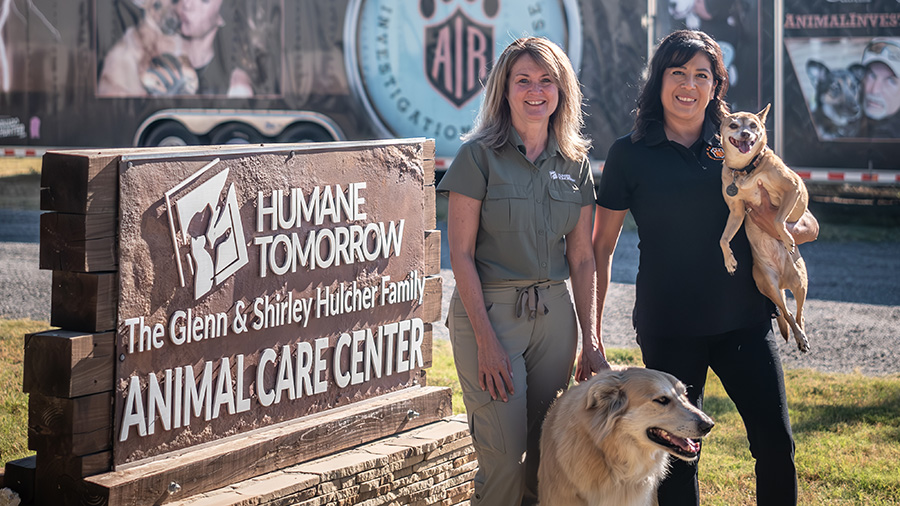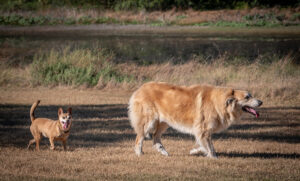
Animal rescue organizers Stacy Smith (left) and Monica Ailey-Welborn
Two North Texas nonprofits team up to rescue animals from neglect and natural disasters
By Linda Blackwell Simmons
Photography by Olaf Growald
We hold our animals closely at 360West and 76092, and this issue highlights two rescue organizations that have worked extensively in North Texas and sometimes together.
Monica Ailey-Welborn is president and co-founder of Animal Investigation and Response, a Fort Worth nonprofit animal protection organization she founded in 2015. AIR rescues and protects animals, large and small, from large-scale neglect and abuse and natural disaster response.
Humane Tomorrow is a nonprofit animal rescue and adoption group dedicated to promoting respect, responsibility, and compassion between animals and people. Founded in 1997 by Stacy Smith, a longtime Flower Mound resident, Humane Tomorrow is based in Argyle and serves North Texas in rescuing unwanted and abused animals and placing them in foster care.
Animal Investigation and Response
On a wintry morning in early 2023, an animal rescue team entered the police department in Burkburnett, about two hours northwest of Fort Worth. The group, organized by Animal Investigation and Response, was prepared for a briefing on a cruelty case that became the largest the team had experienced.
The Burkburnett officers shared with Ailey’s team what they expected to find at the site — then they headed to the location to serve a warrant and secure the scene — a local pet store open for decades. Ailey’s team followed with one of its two 44-foot response units. Upon entering the store, the team encountered the harsh odor of ammonia.
“Our team followed the intense smell and soon found what I still refer to as the room of horrors,” Ailey said. “Hundreds of birds were crammed into a back room. There was not one inch of space that was not covered in feces. The inches of excrement piled in each cage was unbelievable, the water was filthy, and any food was soggy or rotten.”
Wearing respirators, the team discovered 403 animals — cats, rabbits, birds and snakes. Authorities later charged the store’s owner with two misdemeanors.
Ailey and her team often face animal cruelty and neglect, even if this situation was extraordinary.
Ailey’s devotion to the cause began almost two decades ago when she spent weeks in New Orleans assisting with animals displaced due to Hurricane Katrina.
Ailey became certified to work with national organizations that deal with disasters and large-scale animal rescue. In 2010, she accepted the position of Texas state liaison on a national level. Combining her experience and training with the resources that came with being liaison, Ailey became one of the lead animal rescue responders in the country.
With about 260 skilled animal responders mostly located in the DFW area, AIR is the only animal response team that covers the state for these situations. Since inception nine years ago, over 36 deployments have been made by AIR’s team and over 8,000 animals have been rescued.
“We also assist law enforcement and shelters that are taking in animals from large-scale criminal cases such as puppy mills, cockfighting, and hoarding,” Ailey said. “Our organization aids in building cases against abusers so the crimes can be permanently stopped, not just temporarily halted.”
In 2015, AIR received an award from Legacy Humane Society, a Dallas rescue organization, for AIR’s dedication and excellence in building a case against a notorious animal hoarder in Hunt County who had neglected animals for over a decade. AIR’s investigative skills led to the seizure of over 200 animals from the suspected hoarder.
AIR’s investigators are all-volunteer. Together, they have over five decades in animal cruelty investigation, animal control, law enforcement and training.
“The average animal rescue group is not equipped to handle these types of situations which cost thousands of dollars and require special equipment and knowledge,” Ailey said. “One of our hoarding cases near Fort Worth cost over $56,000. We saved 89 animals that day, including dogs and cats. Thanks go to our supporters and volunteers.”
AIR’s two response units allow it to move large numbers of animals safely and comfortably to an emergency temporary shelter. AIR’s veterinary and daily care teams tend to the seized animals.
“If AIR did not exist, the other option that shelters face is to euthanize their existing sheltered animals to make room for the seized animals,” Ailey said. “We can make an emergency temporary shelter from just about any building where we care for the animals until they are released by the courts to be placed with rescue partners, many of which are across the country.”
When natural disasters strike, AIR works alongside jurisdictional entities to provide aid to affected animals. It works with shelters to have a plan to evacuate prior to such events when possible. It also assists in reuniting animals with their owners, as well as providing resources until they can get back on their feet.
Although AIR is 100% mobile in deploying and using its response units — one was dispatched to the Burkburnett case — it plans to purchase 20 or so acres of land in or near north Tarrant County and construct a facility that focuses on animals from large-scale criminal cruelty cases and animals that have been displaced by natural disasters.
“One of our biggest hurdles in every case is having a location to house the animals,” Ailey said. “Sometimes the requesting agency has a site for us to set up our emergency temporary shelter, but that is a rare occurrence. Unfortunately, there are times when the animals are left in reprehensible conditions if space cannot be located. If we had the support, we could solve this and bring those animals to safety.”
Humane Tomorrow
Using its lone facility in Argyle in Denton County, Humane Tomorrow works closely with other organizations, including AIR. It partners with shelters all over North Texas to find homes for animals in need, placing them in foster care until they can find forever homes.
“I grew up loving animals and when I learned about all the amazing ones in Texas shelters, I just could not understand how there was not a solution,” Smith said.
The Argyle facility, on about five acres, is also where AIR maintains its two mobile units when not in use. Humane Tomorrow spent weeks in Houston with the AIR team following Hurricane Harvey in 2017, bringing 25 dogs back to the Argyle facility.
“While the most visible part of what we do is animal rescue and adoption, we recognized early on that adoption alone was not the solution to the homeless animal problem,” Smith said. “We established programs that provide low-cost spay/neuter, assistance with owned animals’ medical costs, and education that promotes empathy, compassion and safety.”
Smith says new problems surfaced in recent years.

Using its facility in Argyle, Humane Tomorrow works closely with other animal rescue organizations.
“The COVID lockdown meant that a year’s worth of animals did not get spayed/neutered, and they are now reproducing at high rates,” Smith said. “At the same time, shelters are afraid to euthanize animals for fear of being criticized by proponents of the no-kill movement. Some are even turning away stray animals. There is massive overcrowding in shelters.”
“The no-kill movement has set unrealistic expectations with the public,” she said. “The no-kill policy causes real harm to municipal and other open-intake shelters by encouraging people to donate, volunteer, and adopt only from no-kill shelters. This compounds the stress already felt by dedicated people who work at these shelters and who do unfortunately have to euthanize animals.”
Humane Tomorrow only accepts animals it believes it can place in foster care within a short time. Foster families become acquainted with the animal and then provide as much information as possible to enable an easier transition to a permanent home.
Love on Wheels is one of Humane Tomorrow’s most successful programs. Started in 2013, its mission is to reduce euthanasia of dogs in Texas shelters by transporting them to areas where demand for adoptable dogs is not currently being met. The largest such area is Upstate New York, home of Helping Hounds Dog Rescue, which takes in the dogs from Texas and finds them homes.
“Love on Wheels matches supply with demand,” Smith said.
Since inception, over 3,000 dogs have found homes through this program, Smith said.
Several of Humane Tomorrow’s animals are supported by the Mercy Fund, a program created in 1998 from the seizure of a large group of dogs from a breeder in Flower Mound. The individual was charged with animal cruelty. The dogs seized were covered in mange, malnourished, and many had injuries related to being caged their entire lives.
“Some animals in our program need extra medical care, maybe from age, illness or abuse,” Smith said. “Adding to these problems is a nationwide severe shortage of veterinarians. The cost of veterinary care has risen sharply in recent years. This results in owners giving up their animals when they cannot afford treatment. We also have a program called Flower’s Fund that assists pet owners with these costs to keep animals in the homes that love them.”
And volunteerism is down since the lockdown.
“Both AIR and our organizations depend heavily on volunteers,” said Smith, who recommends people interested in getting involved find an established organization where they can learn from professionals.
“Social media and the no-kill movement have convinced hundreds of people that it is easy to start and run a rescue themselves,” Smith said. “And it is not. It has led to an uptick in hoarding cases and neglect by the very people who are trying to rescue animals. It hurts those of us doing it the right way.”
AIR and Humane Tomorrow are sustained by donations and volunteers. Humane Tomorrow also has an additional stream of funds from adoption fees and recently hired its first paid employee.
The dire need for fosters is substantiated by Destiny Vandeput, spokesperson for the Humane Society of North Texas, an animal lover with three dogs, one cat and a horse.
“Our overall dog adoptions decreased by 24% from 2022 to 2023,” Vandeput said. “There is no clear indicator why adoptions are down, but when talking to others in animal welfare, it seems to be a trend across the board and that is leading to overcrowding everywhere.”
Because Humane Society is an independent rescue, it can temporarily stop open-intake when it gets full, so it does not euthanize for space.
“HSNT has a 97% live release rate, which means that 97 out of 100 leave our care alive,” Vandeput said. “The remaining 3% are unavoidable primarily due to medical issues.”
